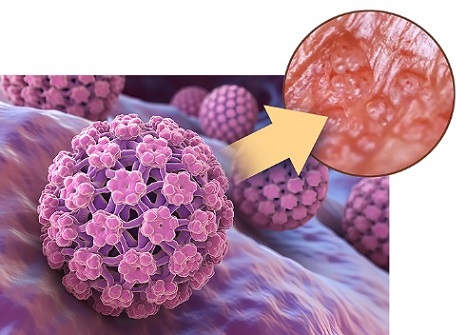Nikhil Prasad Fact checked by:Thailand Medical News Team Feb 05, 2025 2 months, 1 week, 1 day, 17 hours, 21 minutes ago
Medical News:
Scientists Reveal How High-Risk HPV Disrupts Immune Defenses
Researchers from the Department of Biochemistry, Microbiology, and Biotechnology at the School of Molecular and Life Sciences in South Africa have uncovered new insights into how high-risk human papillomaviruses (HPV) manipulate the immune system to promote cancer development. The study explores how these viruses alter the activity of key immune proteins, making it easier for them to evade detection and establish long-term infections that can lead to serious diseases.
 High-Risk HPV and Its Impact on Immune Evasion and Cancer Development
High-Risk HPV and Its Impact on Immune Evasion and Cancer Development
This
Medical News report highlights the intricate mechanisms used by HPV to suppress the body's natural defenses. The study focuses on granzymes A and B, proteins that play an essential role in destroying virus-infected cells. Normally, these proteins are produced by immune cells known as cytotoxic T lymphocytes (CTLs) and natural killer (NK) cells. Their job is to recognize and eliminate harmful cells, including those infected by viruses like HPV. However, high-risk HPV strains, such as HPV-16 and HPV-18, have developed ways to interfere with these processes, helping the virus persist in the body and increasing the risk of cancer.
How HPV Disables the Immune System
Granzymes are powerful enzymes that trigger programmed cell death, or apoptosis, in infected or cancerous cells. In healthy immune responses, CTLs and NK cells release granzymes A and B, which enter infected cells and break them down, preventing viral spread. However, the study reveals that high-risk HPV strains manipulate these enzymes by reducing their activity, weakening the immune response.
The researchers found that HPV achieves this by targeting MHC-I molecules, which are responsible for presenting viral antigens to immune cells. By downregulating MHC-I expression, HPV makes it harder for immune cells to recognize and attack infected cells. This process allows the virus to remain hidden within the body, leading to persistent infections that increase the likelihood of cancer development.
Another crucial aspect of the study is the role of HPV’s E6 and E7 oncoproteins. These viral proteins interfere with the body's natural tumor-suppressing mechanisms. The E6 protein promotes the breakdown of p53, a key protein responsible for detecting damaged cells and signaling their destruction. Similarly, the E7 protein disrupts the function of the retinoblastoma (pRB) protein, which normally prevents uncontrolled cell growth. By disabling these protective mechanisms, HPV not only escapes immune detection but also creates an environment where infected cells can multiply unchecked, increasing the chances of cancer formation.
The Link Between Immune Suppression and Cancer
HPV's ability to interfere with the immune system directly impacts its role in cancer development. When immune cells fail to detect and destroy infected cells, these cells continue to multiply, leading to the formation of tumors. The study suggests that t
his immune evasion is one of the key reasons why high-risk HPV strains are responsible for a significant percentage of cervical, anal, vaginal, and oropharyngeal cancers worldwide.
By weakening the function of granzymes A and B, HPV also alters the overall immune response, creating an environment where cancerous cells can thrive. The researchers emphasize that understanding these mechanisms could open the door to new treatment strategies. Therapies that restore granzyme activity or prevent MHC-I suppression may offer new ways to combat HPV-related cancers.
Potential Treatment Approaches
The study suggests that boosting the immune response could be a key strategy in tackling HPV infections. Current HPV vaccines effectively prevent infection by high-risk strains, but they do not treat existing infections or HPV-related cancers. Therefore, scientists are exploring immunotherapy approaches that could enhance the body's ability to fight HPV.
One potential strategy involves using immune checkpoint inhibitors, drugs that help reactivate the body's immune response against HPV-infected cells. Another approach is to develop therapies that specifically target and reactivate granzymes A and B, restoring the immune system’s ability to eliminate infected and cancerous cells.
Additionally, researchers are investigating the potential of cytokine therapies to boost immune responses. Cytokines like IL-12 and IFN-γ have been shown to enhance the effectiveness of immune cells in detecting and destroying HPV-infected cells. By combining these therapies with existing treatments, scientists hope to improve outcomes for patients with HPV-related cancers.
Conclusion
This study provides crucial insights into how high-risk HPV strains manipulate the immune system, leading to long-term infections and increasing the risk of cancer. By downregulating MHC-I molecules and inhibiting the activity of granzymes A and B, HPV effectively evades immune detection, allowing infected cells to persist and potentially become cancerous. The findings highlight the need for new therapeutic approaches that restore immune function and enhance the body's ability to fight HPV-related diseases.
While HPV vaccines remain a critical tool in preventing new infections, additional research into immunotherapies and targeted treatments could provide new hope for individuals already affected by the virus. Understanding and countering the immune evasion strategies of HPV will be essential in reducing the global burden of HPV-associated cancers.
The study findings were published in the peer-reviewed journal: Viruses.
https://www.mdpi.com/1999-4915/17/2/221
For the latest on HPV-induced Cancers, keep on logging to Thailand
Medical News.
Read Also:
https://www.thailandmedical.news/news/can-lipid-lowering-drugs-aid-in-hpv-associated-cancers
https://www.thailandmedical.news/news/scientists-from-finland-discover-that-hpv16-e6-protein-plays-a-role-in-breast-cancer
https://www.thailandmedical.news/news/natural-compounds-as-hope-for-reducing-hpv-related-cancers
